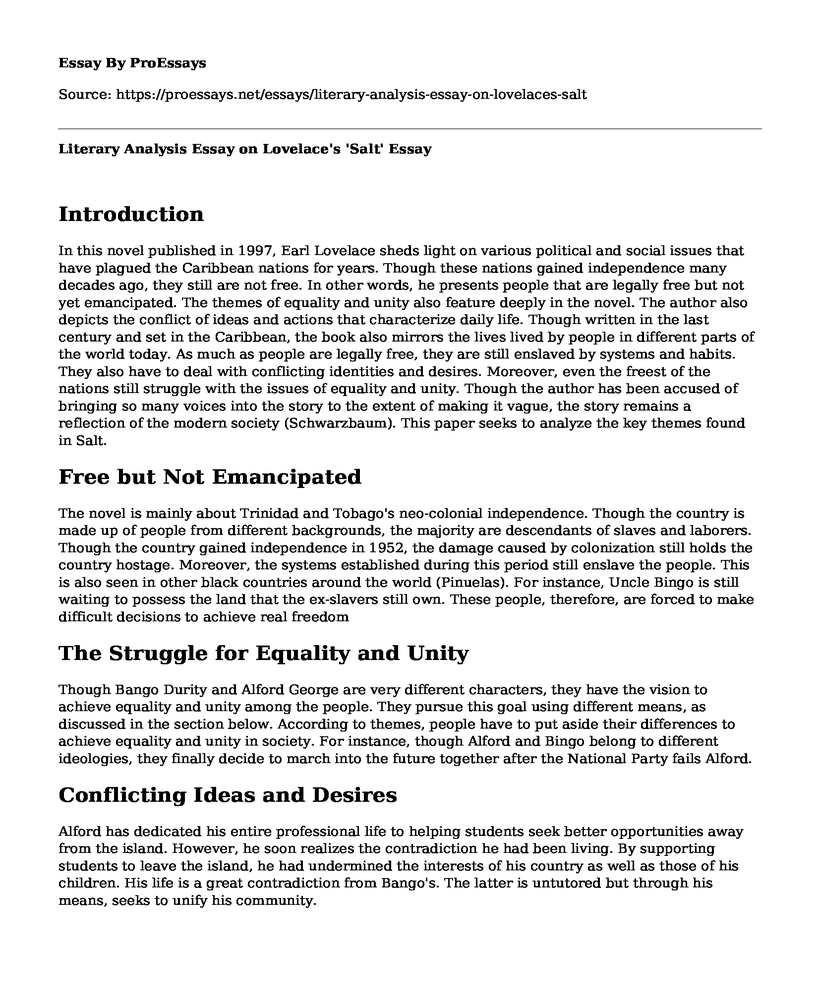Introduction
In this novel published in 1997, Earl Lovelace sheds light on various political and social issues that have plagued the Caribbean nations for years. Though these nations gained independence many decades ago, they still are not free. In other words, he presents people that are legally free but not yet emancipated. The themes of equality and unity also feature deeply in the novel. The author also depicts the conflict of ideas and actions that characterize daily life. Though written in the last century and set in the Caribbean, the book also mirrors the lives lived by people in different parts of the world today. As much as people are legally free, they are still enslaved by systems and habits. They also have to deal with conflicting identities and desires. Moreover, even the freest of the nations still struggle with the issues of equality and unity. Though the author has been accused of bringing so many voices into the story to the extent of making it vague, the story remains a reflection of the modern society (Schwarzbaum). This paper seeks to analyze the key themes found in Salt.
Free but Not Emancipated
The novel is mainly about Trinidad and Tobago's neo-colonial independence. Though the country is made up of people from different backgrounds, the majority are descendants of slaves and laborers. Though the country gained independence in 1952, the damage caused by colonization still holds the country hostage. Moreover, the systems established during this period still enslave the people. This is also seen in other black countries around the world (Pinuelas). For instance, Uncle Bingo is still waiting to possess the land that the ex-slavers still own. These people, therefore, are forced to make difficult decisions to achieve real freedom
The Struggle for Equality and Unity
Though Bango Durity and Alford George are very different characters, they have the vision to achieve equality and unity among the people. They pursue this goal using different means, as discussed in the section below. According to themes, people have to put aside their differences to achieve equality and unity in society. For instance, though Alford and Bingo belong to different ideologies, they finally decide to march into the future together after the National Party fails Alford.
Conflicting Ideas and Desires
Alford has dedicated his entire professional life to helping students seek better opportunities away from the island. However, he soon realizes the contradiction he had been living. By supporting students to leave the island, he had undermined the interests of his country as well as those of his children. His life is a great contradiction from Bango's. The latter is untutored but through his means, seeks to unify his community.
Conclusion
As stated earlier, the book is a reflection of modern society. Though countries and individuals claim to be free, they are still held captive by their past. As much as the island is free, the system established during the colonial rule still adversely affects the people. As such, they cannot claim to be entirely free. Inequality and lack of unity is also a challenge that different countries around the world struggle with. For instance, while some countries are plagued by racism, others have to deal with huge economic inequality. All these factors affect the quality of life of the people and also infringes on their freedom. To overcome, this as shown in the book, people must set aside their ideological differences as well as conflicting agendas, and march together into a shared future.
Works Cited
Pinuelas, Edward R. "Sounding the masses: sonic collectivity and the politics of noise in Earl Lovelace's Salt." African and Black Diaspora: An International Journal 9.1 (2016): 70-81. <https://www.tandfonline.com/doi/abs/10.1080/17528631.2015.1055651>.
Schwarzbaum, Lisa. "Lovelace's 'Salt': heat, smell, a novel." 9 March 1997. The Baltimore Sun. 26 November 2019. <https://www.baltimoresun.com/news/bs-xpm-1997-03-09-1997068014-story.html>.
Cite this page
Literary Analysis Essay on Lovelace's 'Salt'. (2023, Mar 09). Retrieved from https://proessays.net/essays/literary-analysis-essay-on-lovelaces-salt
If you are the original author of this essay and no longer wish to have it published on the ProEssays website, please click below to request its removal:
- Iago Is Not Entirely to Blame for the Othello Tragedy - Controversial Essay
- Contemporary Society as Depicted in George Orwells 1984
- Paper Example on Odysseus, Aeneas, and Antigone
- Literary Analysis Essay on The E-Myth
- Literary Analysis Essay on the Names by Scott Momaday
- Essay Example on Miss Emily's Unfortunate Life: A Study in Faulkner's A Rose for Emily
- Essay Example on Hamlet's Unrequited Love for Ophelia: A Tragic Tale







